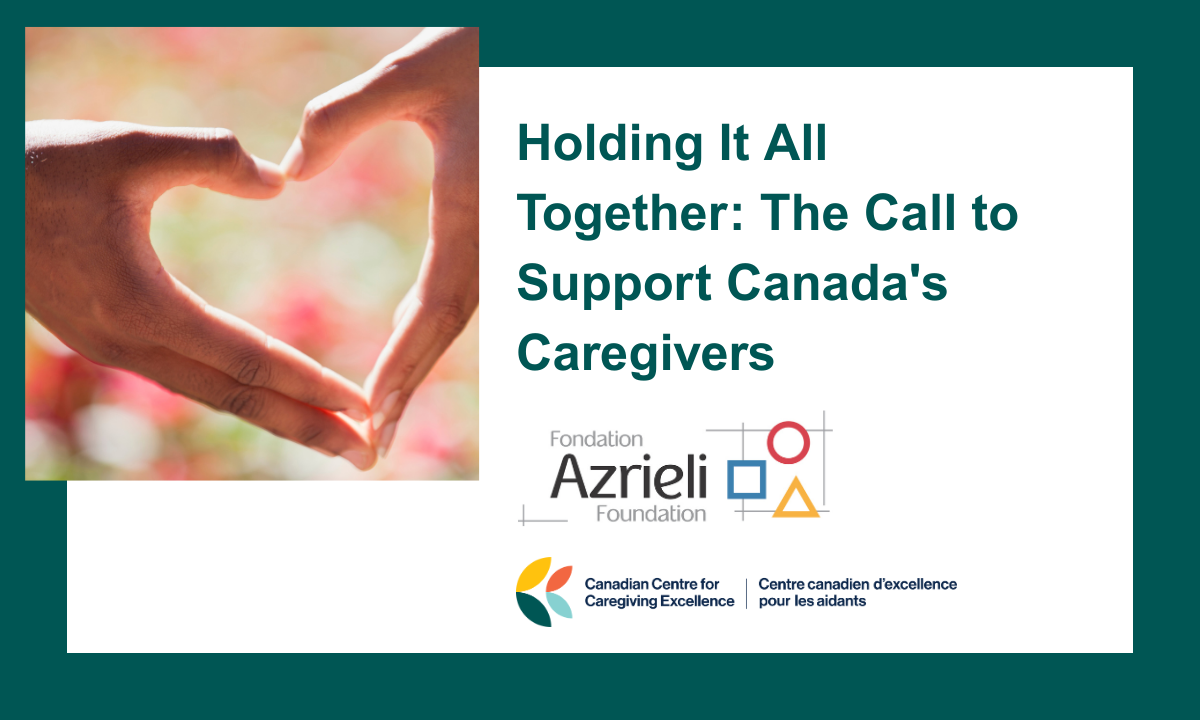Holding It All Together: The Call to Support Canada’s Caregivers
May 8, 2025
By Liv Mendelsohn, Executive Director, The Azrieli Foundation’s Canadian Centre for Caregiving Excellence
Beside every person receiving palliative care is a caregiver — a mother, a son, a spouse, a devoted friend — quietly holding everything together. They are the ones ensuring prescriptions are filled, doctor’s appointments are booked and kept, and — perhaps most importantly — offering a steady, loving presence amid pain, fear and uncertainty.
Caring for someone in the final stages of life is one of the most profound acts of love. End-of-life care is not just about providing comfort — it’s about honouring a person’s wishes, being present through difficult moments, and sharing in the final chapter of their life. Caregivers are there with their loved ones — day after day — to support their choices, ease their pain and help them maintain dignity.
Caregivers give so much of themselves — their time, their energy, their health — often putting their own lives and careers on hold. Many step away from work entirely to be at their loved ones’ side. Their efforts may go unseen, but they are indispensable. This kind of care is the backbone of the entire healthcare system.
In fact, caregivers provide 70 to 90% of all care in Canada.
Palliative care caregivers carry more than daily tasks — they carry financial strain, exhaustion and the relentless ache of anticipatory grief. And yet, their needs are largely invisible, their efforts too often unacknowledged.
Half of us will be caregivers at some point in our lives. Being a caregiver isn’t the exception — it’s the rule. And still, despite this near universal experience, caregivers remain unsupported, unheard, and too often, unseen.
We believe it’s time for that to change.
We see caregivers.
We value them.
And we are working to ensure they are supported every step of the way.
Caring in Canada
In 2023, the Canadian Centre for Caregiving Excellence (CCCE), a program of the Azrieli Foundation, conducted a pan-Canadian survey to better understand the experiences of caregivers and paid care providers in the country.
The results of the survey, published in our 2024 report Caring in Canada revealed that:
- Caregivers are feeling tired (47%), worried or anxious (44%), or overwhelmed (37%) because of caregiving responsibilities.
- Caregivers provide an average of 5.1 hours of care a day, adding up to over 30 hours of unpaid care, or almost the equivalent of a full-time job.
- Nearly one in five caregivers are over the age of 65. Senior caregivers are least likely to access any services or supports to ease their responsibilities.
- Half of caregivers have experienced financial stress in the past year due to caregiving, with many providing financial support to the person they care for.
- Racialized, Indigenous and LGBTQ2S+ caregivers are more likely to experience negative impacts of care.
Caring for a person with a life-limiting illness can often mean more intense and prolonged periods of care. While supports do exist for caregivers at this stage, such as the federal Compassionate Care Leave, they are challenging to access and many caregivers don’t know they exist.
Better is possible
There is an urgent need for public policy solutions to effectively address the key challenges faced by caregivers in Canada.
While each caregiving journey is different, our survey highlights that the core needs of caregivers remain largely the same.
What do caregivers want?
- Access to respite.
- Financial support.
- Caregiver friendly workplace policies.
A National Caregiving Strategy for Canada
With a new government taking office, the moment to advocate for caregiver-focused policies is here. The Liberal government has committed to advancing a national caregiving strategy in their 2025 election platform
According to the document, “The Strategy will focus on early recognition of caregivers, simplified and increased access to government benefits and services, and better coordination on emotional, financial and practical support with the provinces and territories.”
While the government begins their work, CCCE released A National Caregiving Strategy for Canada, which contains actionable public policy solutions. The strategy was co-created in consultation with thousands of Canadians throughout 2024, via webinars, in-person sessions, town halls and discussions at conferences and other convenings. With ideas based on successful regional models from Canada and abroad, the strategy highlights that, with the right political will, this vision is within reach.
The strategy contains five pillars:
- Financial Relief – A refundable tax credit and caregiver allowance to ease financial strain.
- Stronger Workplace Support – Improved leave policies and benefits so caregivers can take time off work when needed.
- Better Access to Disability Benefits – Simplified disability and medical tax credits for essentials like groceries and rent.
- Respect for Paid Care Providers – Living wages and stronger protections for essential care workers, like personal support workers.
- Federal Leadership – A national commitment to solve this crisis now and for the future.
Act on Care
We’re urging Canadians to take action now and support the strategy by joining our Act on Care campaign.
Join our movement by visiting canadiancaregiving.org/act and completing a short form to send a letter to Prime Minister Carney, your local MP and key ministers responsible for moving care policies forward.
More than 12,000 Canadians have added their name to date. Join our call for our government to Act on Care and make caregiving a national priority.
About the Canadian Centre for Caregiving Excellence
The Canadian Centre for Caregiving Excellence, a program of the Azrieli Foundation, supports and empowers family caregivers and care providers across Canada. We bring together stakeholders from across the country, translate knowledge to practice, scale what works and fill gaps through innovation. We are guided by four focus areas: support networks and knowledge sharing; education and leadership development; advocacy and policy development; and inclusion and underserved communities. Our expertise and insight, drawn from lived experiences, help us campaign for better systems and lasting change. We work closely with our partners and grantees towards shared goals and better experiences for all those who provide care.
Have an article you’d like to submit?
Contact us at: [email protected]



